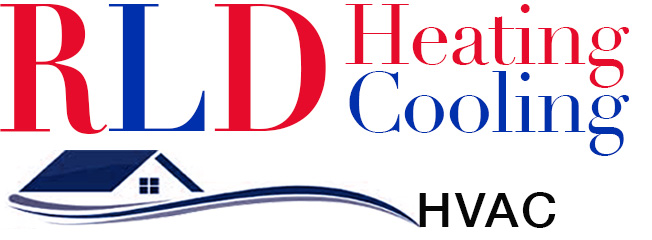Heat Pump vs. Oil Furnace in Los Angeles: Which works best for you?
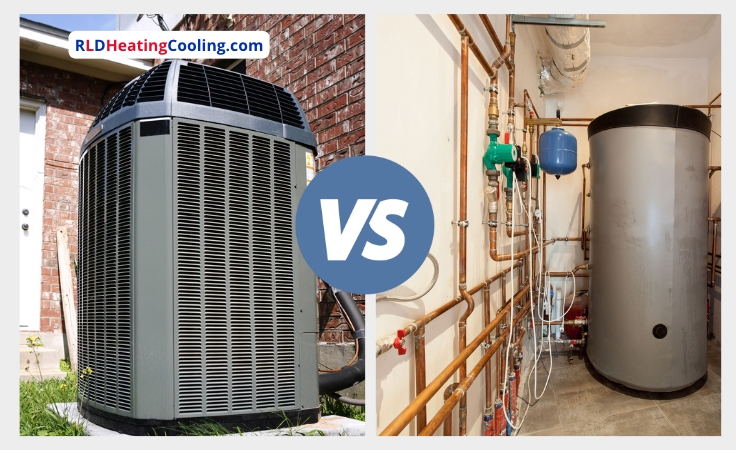
When it comes to heating your house, most people choose between a heat pump and vs. furnace.
Though both systems heat your house, they follow different processes.
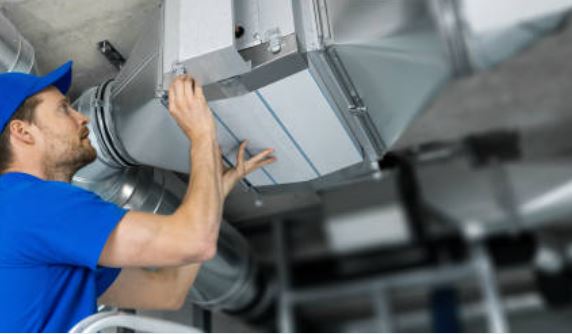
call 818-210-6669
Contact us today for your HVAC needs
For example, furnaces produce heat by burning oil or natural gas, while heat pumps rely on electricity.
But most people need help deciding whether the heat pump vs. oil heat is better for their house.
In this blog, we will attempt to clarify which system is most suitable for various types of weather conditions, house sizes, costs, and other relevant factors.
How do Heat Pumps work?
A heat pump works similarly to a refrigerator.
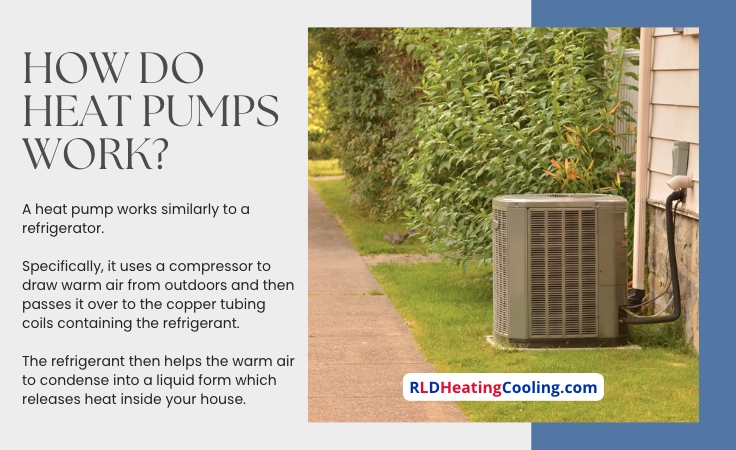
Specifically, it uses a compressor to draw warm air from outdoors and then passes it over the copper tubing coils containing the refrigerant.
The refrigerant then helps warm air condense into a liquid form, releasing heat inside your house.
In simple terms, it is a system that distributes heat from one point to another.
Also, the heat pumps draw heat from outside or from underground. So, the units that generate heat from outside air are known as air-source heat pumps. At the same time, the units that draw heat from underground are known as geothermal heat pumps.
Another category of such units is called “air-to-water” heat pumps. These systems extract heat from the outside environment and heat the air and water to distribute around your house.
However, it is crucial to note that heat pump systems don’t work well in extreme temperatures.
Pros & cons of a Heat Pump
Here are some of the pros of heat pumps:
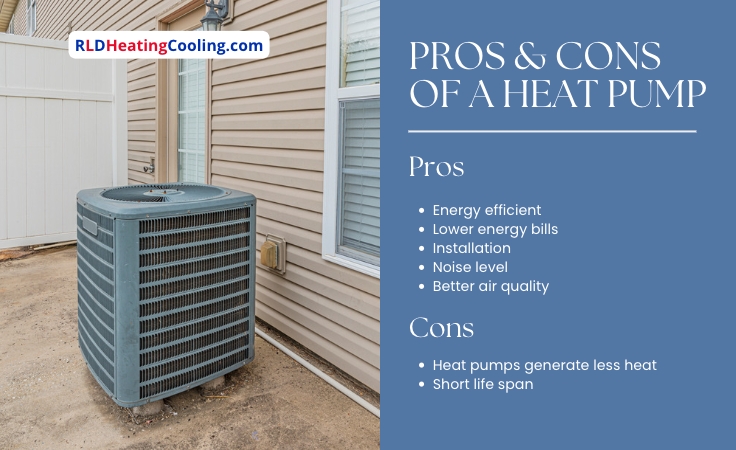
- Energy efficient: A heat pump is more energy efficient than a gas or electric furnace.
- Lower energy bills: Generally, heat pumps work on low energy, so you can save a lot on energy costs.
- Installation: The heating system installation is easy and quick for heat pumps.
- Noise level: The system makes a very low noise, and the sound isn’t noticeable.
- Dual function: A heat pump can also work as an air conditioner and cool your house during hot seasons.
- Better air quality: Heat pumps don’t produce CO2; therefore, you don’t have to worry about carbon monoxide leaks.
Here are some of the disadvantages of heat pumps:
- Heat pumps generate less heat than oil furnaces. Therefore, they are not the ideal choice if you live in a location that experiences frigid temperatures. The main reason is that heat pumps draw air from the outside environment to heat the air. So if the outside air is cold, the system will struggle to generate heat. Other systems work along with heat pumps to generate heat, but they use a lot of energy.
- Short life span: The average life span of a heat pump is around 15 years, which is low compared to oil furnaces.
How does an Oil Furnace work?
Unlike the heat pump, an oil-fired furnace does not draw heat from outside.
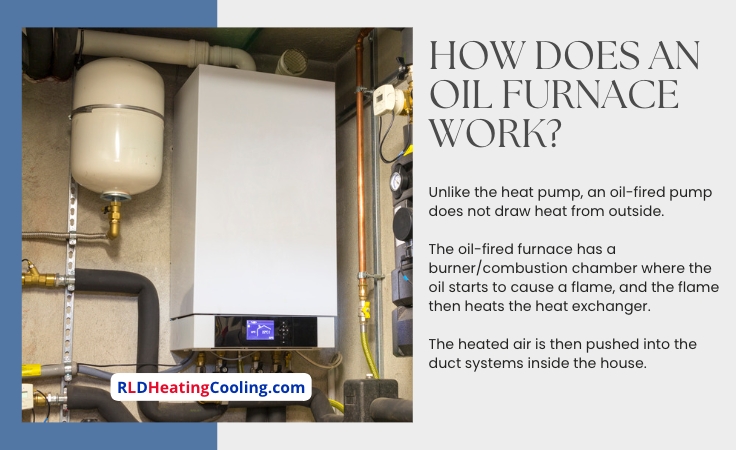
The oil-fired furnace features a burner and combustion chamber where the oil ignites a flame, which then heats the heat exchanger.
The heated air is then pushed into the duct systems inside the house.
In most homes, the oil-fired furnaces are connected to the thermostats, which control the temperature of your house.
As you set the desired temperature, the thermostat switches the furnace on/off accordingly.
The best thing about these automatic systems is that they help you save on heating and energy costs.
The oil-fired furnaces can achieve 98.5% efficiency. (1)
Pros & cons of Oil Furnace
Here are some of the pros of installing an oil furnace:
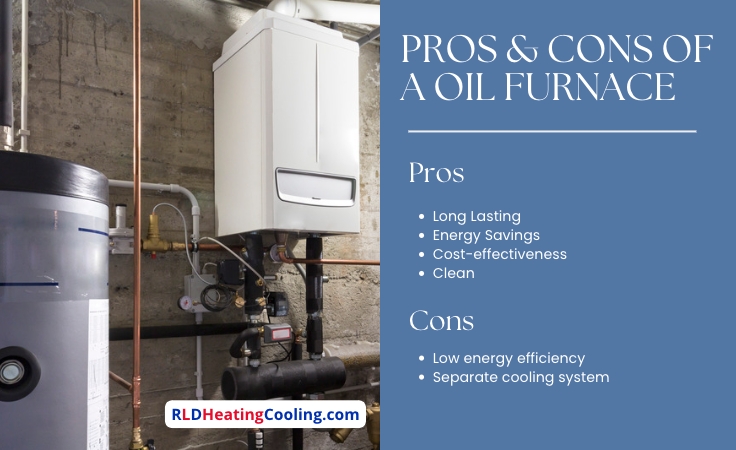
- Long Lasting: Oil furnaces generally have a long life and, if properly maintained and with regular oil furnace repair, can last up to 30 years.
- Energy savings: An oil furnace can heat your house much better than a heat pump while consuming less energy. A gallon of oil delivers more heat per BTU than a heat pump. Also, it burns hotter and can heat your home quickly.
- Cost-effectiveness: Heating oil is quickly and widely available globally and costs less than electric bills. So, heating with oil is more pocket-friendly than heating with a heat pump.
- Clean: A well-maintained oil furnace works without creating a mess around. It doesn’t release any smoke or odor into your house, so the air quality of your house is not compromised.
However, oil furnaces still have some disadvantages:
- Low energy efficiency: Even though oil furnaces have become much more efficient than they were a decade ago, their efficiency is still below par compared to a heat pump.
- Separate cooling system: If you own a furnace, you will need to install separate cooling equipment. However, a heat pump can act as a two-in-one device.
What is a dual system?
Dual-fuel systems combine the best features of a heat pump and an oil or natural gas furnace into a single or multifunctional system.
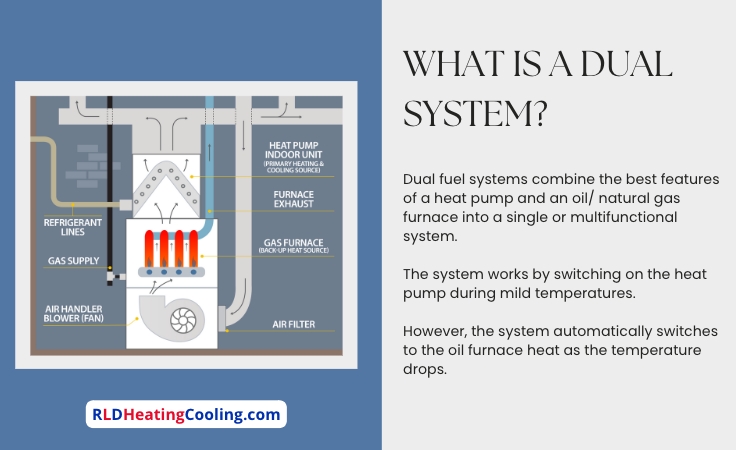
The system works by switching on the heat pump during mild temperatures.
However, the system automatically switches to the oil furnace heat as the temperature drops.
Not only does it provide you with optimum comfort, but it also helps you save on energy costs.
Heat pump vs. Oil furnace Dual system factor #1: Installation cost
The total installation cost of your furnace, heat pump, or dual-fuel system mainly depends on your home’s setup, size, and current system.
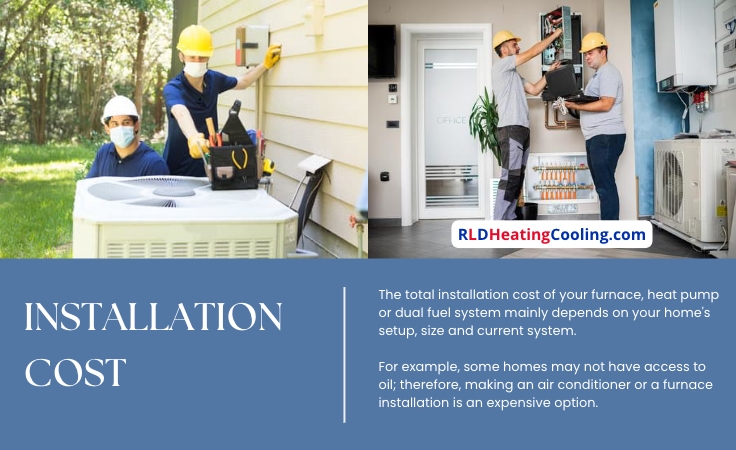
For example, some homes may not have access to oil; therefore, making an air conditioner or a furnace installation is an expensive option.
On the other hand, if your home is not prepared or wired for supplementary heating with a heat pump, you might incur additional costs.
Therefore, you must contact professional heating companies to help you determine which system is best for your home, according to your budget and for other heating services.
Heat pump vs. Oil furnace Dual system factor #2: Energy Efficiency
Under normal conditions, a heat pump transfers 300 percent more energy than it consumes.
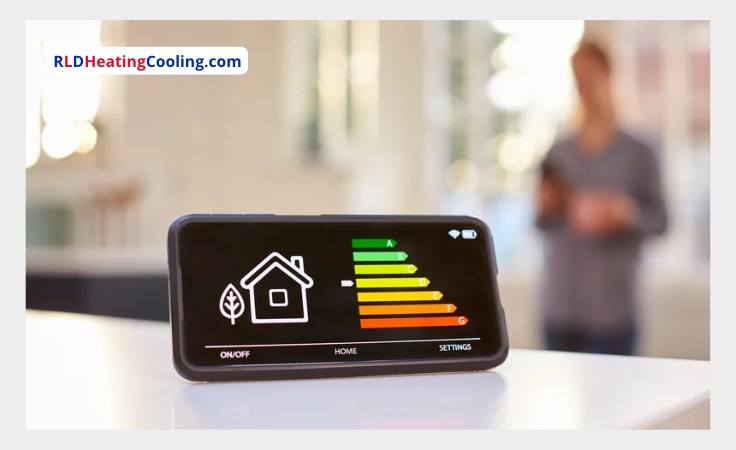
On the other hand, high-efficiency oil furnaces are around 95% efficient.
Heat pumps operate on electricity, so you can save a lot on fuel consumption.
Additionally, heat pumps are ideal for moderate climates and can serve as both heating and cooling systems.
Heat pump vs. Oil furnace Dual system factor #3: Air Quality
Regarding indoor air quality, heat pumps and oil furnaces are proven to be excellent at maintaining the air quality of your house.
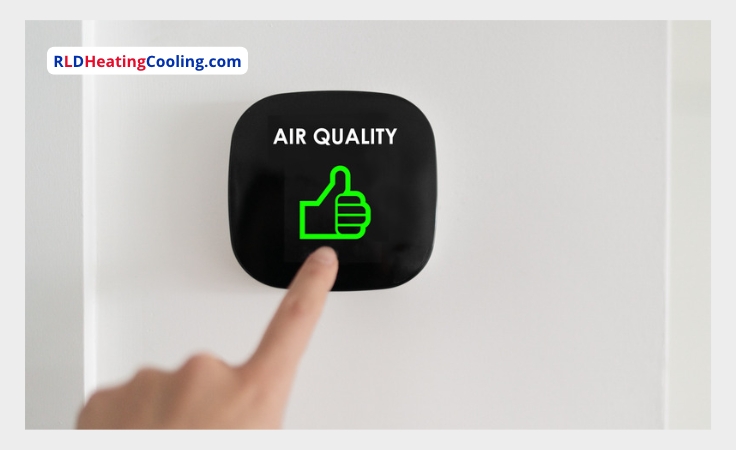
However, if you want to be more careful, you can choose home air cleaners or fresh air ventilators.
Heat pump vs. Oil furnace Dual system factor #4: Cold Weather effectiveness
An oil furnace can generate heat in your house even if the outside temperature is dropping.

However, if the outside temperature drops below the freezing point, a heat pump may struggle to keep you warm.
And that is when the dual systems come in handy.
With the dual system, you don’t have to use supplemental heating equipment for colder days.
The dual system will handle both mild and freezing temperatures.
The system quickly switches between heat sources, depending on the outside temperature, to meet the needs of your home and family.
So, you get better comfort at great prices without paying for extra heating installations and energy costs.
Heat pump vs. Oil furnace Dual system factor #5: Comfort
Even though heat pumps don’t generate much heat, the air they circulate is naturally humid.
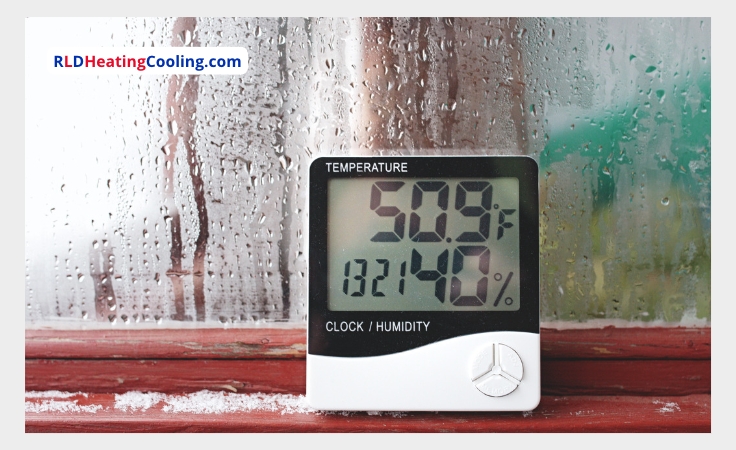
So, the humidity levels inside your house are maintained, unlike the furnaces, which even dry out your skin.
Furnaces blow hot and dry air, while the heat pump blows cool air.
So, with a dual system, you benefit from both systems; the humidity levels are maintained while enjoying the hot air.
Heat pump vs. Oil furnace Dual system factor #6: Location
Understanding that every home and homeowner has different needs is essential.
However, some general recommendations can help you decide which heating source is the right fit.
A heat pump can be the ideal match if you live in a place that experiences temperatures of around 30- 40 degrees Fahrenheit.
Other than that, the locations with low electricity rates are also well-suited for heat pumps.
On the contrary, if the place you live in experiences below-freezing temperatures, an oil furnace or a dual system is an excellent choice.
Oil furnaces operate better in cold climates as they don’t rely on outside air to heat your house.
Also check out: Furnaces vs water heater.
Best heating and HVAC services at RLD Services
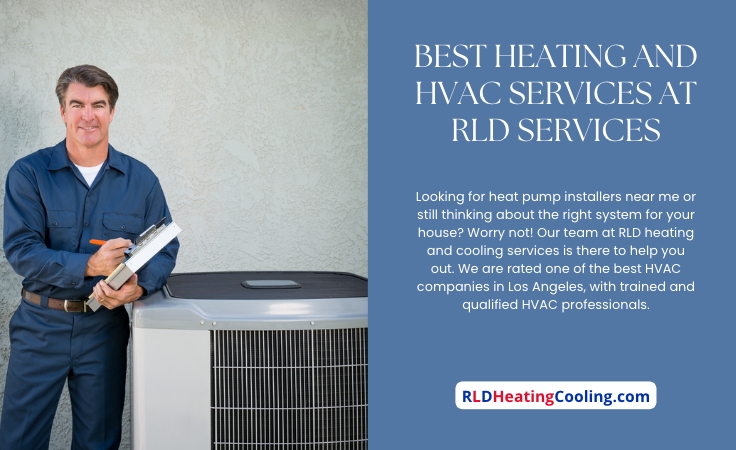
Looking for heat pump installers near me or still thinking about the right system for your house? Worry not! Our team at RLD Heating and Cooling Services is there to help you out. We are rated as one of the best HVAC companies in Los Angeles, with trained and qualified HVAC professionals.
We deal in top-rated brands like Goodman, Bryant, Lennox and more. Our expert technicians can help you determine the right system for your home, tailored to your specific needs. Contact us to book an appointment.
FAQ
Here are some of the things people usually ask:
Heat pump vs. Oil furnace FAQ #1: Is it worth switching from oil to a heat pump?
Converting to an electric heat pump is a wise option if you’re ready and comfortable with switching from oil to electric heat pumps. Heat pumps are one of the most efficient, best and clean sources if you want to reduce fuel use.
Heat pump vs. Oil furnace FAQ #2: What is the downside to a heat pump?
Air source heat pumps can encounter problems such as icing during cold temperatures, which can ultimately damage the system. Though modern heat pumps have an in-built automatic defrosting, the efficiency might drop during cold temperatures. Also, electricity usage increases during these cold seasons.
Heat pump vs. Oil furnace FAQ #3: Can a heat pump run on oil?
Yes, a heat pump can run on oil. However, that becomes an entirely new and different system, ie, the dual system. It combines a heat pump, oil/gas furnace, or boiler and can be single or multifunctional.
The best aspect of these systems is that they benefit both heat pumps and furnaces. Therefore, you get both energy savings and optimal comfort.
Heat pump vs. Oil furnace FAQ #4: What is the most efficient heating system?
A heat pump is the most efficient home heating equipment.
They are both energy-efficient and help maintain the air quality of your house.
However, their main disadvantage is that they are not suitable for extreme temperatures.
If you live in a place that experiences harsh winters, you may need additional systems or equipment to warm your house.

call 818-210-6669
Contact 24/7 our scheduling department today
Our Address is
RLD Heating Cooling
8040 Deering Ave #5
Canoga Park CA 91304
Opening hours
Monday 8 am – 8 pm
Tuesday 8 am – 8 pm
Wednesday 8 am – 8 pm
Thursday 8 am – 8 pm
Friday 8 am – 8 pm
Saturday 8 am – 8 pm
Sunday 9 am – 5 pm
Sources:
- https://www.energy.gov/energysaver/furnaces-and-boilers#:~:text=Although%20older%20fossil%20fuel%20furnace,useful%20heat%20for%20your%20home.
